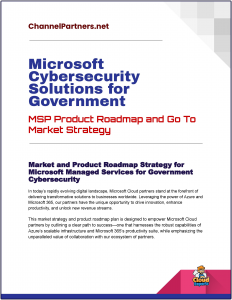The MSP Opportunity for Microsoft 365 and Cybersecurity Solutions for Government
Navigating the U.S. government market and capitalizing on the immense potential of Microsoft Cybersecurity and 365 managed services.
 An overview of the opportunity and strategy for MSPs to address the massive USA GovCloud 365 market.
An overview of the opportunity and strategy for MSPs to address the massive USA GovCloud 365 market.
The market opportunity for channel partners associated with Microsoft 365 GCC High is significant, driven by the unique needs of U.S. government agencies, defense contractors, and organizations handling sensitive data subject to stringent compliance requirements.
Digital Transformation in Government – Federal, state, local, and tribal governments, as well as defense contractors, are increasingly adopting cloud-based solutions to modernize operations, enhance collaboration, and improve security.
Microsoft 365 GCC High offers tools like Exchange Online, SharePoint, Teams (via Direct Routing), and Microsoft 365 Apps in a secure environment, making it a preferred choice for these organizations.
This book is your guide to navigating the U.S. government market, understanding its unique requirements, and capitalizing on the immense potential of Microsoft Cybersecurity and 365 managed services.
Whether you’re an established partner or new to the public sector, the strategies, insights, and best practices outlined in these pages will equip you to build a thriving practice, win government contracts, and deliver exceptional value to one of the most critical markets in the world.
Market Drivers
Microsoft 365 GCC High is designed to meet rigorous U.S. government standards, including FedRAMP High, NIST 800-171, DFARS 7012, ITAR, and DoD Impact Level 4/5 (IL4/IL5).
Organizations handling Controlled Unclassified Information (CUI), Covered Defense Information (CDI), or International Traffic in Arms Regulations (ITAR) data are required to use secure cloud environments like GCC High. This creates a growing demand for compliant cloud solutions, particularly as cybersecurity regulations like the Cybersecurity Maturity Model Certification (CMMC) gain traction.
Unlike commercial Microsoft 365, GCC High operates in a sovereign cloud environment with data centers in the continental U.S., staffed by screened U.S. citizens. This exclusivity limits the use of commercial clouds for sensitive workloads, funneling demand to GCC High and its authorized partners.
Rising ransomware and cyber threats targeting government and defense sectors increase the need for secure, compliant cloud solutions. Partners offering GCC High can capitalize on this by providing managed security services and compliance expertise.
Target Markets
- Government Agencies: Federal, state, local, and tribal governments require GCC High to comply with federal cloud service mandates. These entities often lack the in-house expertise to deploy and manage cloud solutions, creating opportunities for partners to offer implementation, migration, and support services.
- Defense Contractors: Companies in the defense industrial base (DIB), particularly those handling CUI or ITAR data, must use GCC High to meet DoD requirements. The CMMC framework further mandates compliance for DoD contractors, driving demand for GCC High among small, medium, and large contractors.
- Commercial Entities with Regulated Data: Private organizations processing government-regulated data (e.g., CJIS, IRS 1075) or operating as subcontractors to government agencies qualify for GCC High. This includes industries like aerospace, manufacturing, and healthcare serving government contracts.
- International Entities with U.S. Subsidiaries: Non-U.S. companies with U.S.-based subsidiaries handling regulated data may also require GCC High, expanding the market to global firms with U.S. government ties.
Revenue Opportunities for Channel Partners
Partners in the Microsoft Cloud Solution Provider (CSP) program can sell GCC High subscriptions, earning recurring revenue. Only select partners, such as Authorized Online Services-Government (AOS-G) partners or those with GCC High validation, can transact these licenses, reducing competition and increasing margins.
GCC High deployments often require complex configurations, migrations, and ongoing management due to compliance needs. Partners can offer managed IT services, including security monitoring, compliance audits, and user support, which command premium pricing. For example, Forrester’s Total Economic Impact Study notes that Microsoft 365 increases partner revenue opportunities by over 50% compared to Office 365 alone, with managed services being a key driver.
- Implementation and Migration: Transitioning to GCC High involves validating eligibility, migrating data from commercial or on-premises environments, and configuring compliance settings. Partners with expertise in Azure Government, Microsoft Entra ID, and GCC High-specific integrations can charge for professional services.
- Value-Added Services: Partners can bundle GCC High with complementary offerings, such as cybersecurity solutions (e.g., Microsoft Defender, Azure Information Protection), automation tools, or custom applications built on Azure. Multi-party private offers (MPOs) through Azure Marketplace allow partners to collaborate with ISVs, enhancing deal value.
- Training and Consulting: Government and contractor clients often need training on GCC High features and compliance frameworks like CMMC or NIST 800-171. Partners can provide consulting services to assess compliance gaps and develop roadmaps, further diversifying revenue streams.
- High Customer Retention: Government and defense clients prioritize long-term relationships due to the complexity and sensitivity of their workloads. Partners delivering reliable GCC High services can secure multi-year contracts, ensuring stable revenue.
Strategy for Partners
The market opportunity for channel partners in Microsoft 365 GCC High is substantial, driven by the growing demand for compliant cloud solutions in the U.S. public sector and defense industries. Partners can capitalize on recurring licensing revenue, high-margin managed services, and value-added offerings while benefiting from Microsoft’s partner ecosystem and exclusive access to a niche market.
- Eligibility and Validation: Partners must complete a rigorous approval process to sell GCC High, including submitting a Government Community Cloud eligibility form and ensuring compliance with Microsoft’s requirements. This can be a barrier for smaller partners.
- Feature Limitations: GCC High has reduced feature parity compared to commercial Microsoft 365, such as the absence of Viva Engage, PSTN Calling, and certain mobile device extensions. Partners must manage client expectations and provide workarounds.
- Complex Deployments: GCC High requires integration with Azure Government and Microsoft Entra ID, which demands specialized skills. Partners need certified personnel to handle these deployments effectively.
- Customer Validation: Clients must also undergo Microsoft’s validation process to purchase GCC High, which can delay sales cycles. Partners must guide customers through this process, adding to their workload.
- Specialize in Compliance: Partners should develop expertise in CMMC, NIST 800-171, and ITAR to differentiate themselves. Certifications like Microsoft Gold Partner or Expert MSP enhance credibility.
- Target Niche Segments: Focus on specific industries like defense, aerospace, or local government to build tailored solutions and establish a strong reputation.
- Collaborate with ISVs: Partner with independent software vendors (ISVs) to bundle GCC High with complementary tools, such as cybersecurity or automation solutions, through Azure Marketplace.
Success requires overcoming barriers like eligibility validation, technical complexity, and feature limitations through specialization, strategic partnerships, and leveraging Microsoft’s resources. With the cloud market expanding and government cloud adoption accelerating, GCC High presents a lucrative, long-term opportunity for qualified channel partners.




